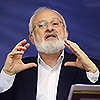Audio Version Of The Blog – 04.11.14
Listen to an Audio Version of the Blog
Download: MP3 Audio
[audio:http://files.kabbalahmedia.info/audio/eng_o_rav_2014-04-11_declamation_blog-rav_full.mp3 title=’11.4.14′]

Listen to an Audio Version of the Blog
Download: MP3 Audio
[audio:http://files.kabbalahmedia.info/audio/eng_o_rav_2014-04-11_declamation_blog-rav_full.mp3 title=’11.4.14′]
 In the News (from The Economist): “Faith in democracy flares up in moments of triumph, such as the overthrow of unpopular regimes in Cairo or Kiev, only to sputter out once again. Outside the West, democracy often advances only to collapse. And within the West, democracy has too often become associated with debt and dysfunction at home and overreach abroad.
In the News (from The Economist): “Faith in democracy flares up in moments of triumph, such as the overthrow of unpopular regimes in Cairo or Kiev, only to sputter out once again. Outside the West, democracy often advances only to collapse. And within the West, democracy has too often become associated with debt and dysfunction at home and overreach abroad.
“Adjusting to hard times will be made even more difficult by a growing cynicism towards politics. Party membership is declining across the developed world: only 1% of Britons are now members of political parties compared with 20% in 1950. Voter turnout is falling, too: a study of 49 democracies found that it had declined by 10 percentage points between 1980-84 and 2007-13. A survey of seven European countries in 2012 found that more than half of voters ‘had no trust in government’ whatsoever. A YouGov opinion poll of British voters in the same year found that 62% of those polled agreed that ‘politicians tell lies all the time.’
“Many Chinese are prepared to put up with their system if it delivers growth. The 2013 Pew Survey of Global Attitudes showed that 85% of Chinese were ‘very satisfied’ with their country’s direction, compared with 31% of Americans.
“Wang Jisi, also of Beijing University, has observed that ‘many developing countries that have introduced Western values and political systems are experiencing disorder and chaos’ and that China offers an alternative model.”
My Comment: The egoistic stages of human development have gone through five stages of evolutionary development and had exhausted themselves by the beginning of the 21st century, and now push humanity to the new stage, altruism, i.e., they need to be replaced by the new stages of development, by the five steps of the property of bestowal and love.
Awareness of the necessity of this rise is problematic because it presupposes the need to admit oneself below nature, to obey its integrality and globality, and to learn how to reach similarity with it (adhesion with it).
[132416]
Related Material:
The Rise And Fall Of Democracy
Democracy Benefits Only The Middle Class
Democracy, The Rule Of The Spiritual Nation
 The spiritual world is a world of qualities which is dominated by the attribute of bestowal, the force of bestowal, the attribute of love and giving. If a person has this attribute, it means that he is in the spiritual world.
The spiritual world is a world of qualities which is dominated by the attribute of bestowal, the force of bestowal, the attribute of love and giving. If a person has this attribute, it means that he is in the spiritual world.
If an opposite property dominates a person, the attribute of receiving, and he is totally immersed in it, it means that he is in the corporeal world.
Everything depends on the force that operates in you, that dominates you and that manages you. If it is the force of receiving, egoistic desires and calculations, it means that you feel the corporeal world and live in it. But if you suddenly acquire the force of bestowal and are incorporated in it, it means that you are in the spiritual world. We cannot imagine the difference between the two worlds. It is impossible to describe or to explain it.
Because the desire to receive needs to be corrected and its power is revealed temporarily, when it is over and succumbs to the domination of the desire to bestow, we are also in a desire to receive, in the perishable temporary matter, as we are born, live, and die. It is a replica of the spiritual force, the desire to receive, after seventy years, seventy levels, must disappear and turn into a desire to bestow.
Exile is a feeling in the desire to receive that has to undergo a change and reach the form of bestowal. The created being cannot bestow; he can only be a desire to receive, while bestowal is the attribute of the Creator. But when the desire to receive works with the intention of in order to bestow and enslaves itself to others and to the Creator, it means that it bestows.
Thus we can be in only two states; Pharaoh’s slave working for the desire to receive, or the Creator’s servant working for the desire to bestow. All our work is to help ourselves and the whole world reach the desire to bestow and to delight the Creator.
If we don’t add this goal, it isn’t a desire to bestow anymore. The desire to bestow can be expressed only in one way, by delighting the Creator, because then this desire, this inclination, is detached from me and doesn’t receive a reward. It does come from me, but doesn’t return to me.
If I operate for the sake of the created beings, the friends, the group, and don’t intend to delight the Creator by that, it means that I don’t follow the line of bestowal to the end and that I still operate for my own sake. Only if I intend to reach the Creator is my intention relatively pure, according to my level.
[132045]
From the 4th part of the Daily Kabbalah Lesson 4/7/14, Writings of the Ari
Related Material:
Overthrowing The Old Foolish King
Apparently I Am A Slave Of Pharaoh
Redemption Under Cover Of Darkness
 The Book of Zohar, “VaYikra,” item 73: All the sacrifices are male and female, since the sacrifice is above the heart, which is about the thought that is above the heart. And it shall be known what is about the heart, which means the thought.
The Book of Zohar, “VaYikra,” item 73: All the sacrifices are male and female, since the sacrifice is above the heart, which is about the thought that is above the heart. And it shall be known what is about the heart, which means the thought.
The thought that is clever is considered a male, and the heart is considered a female, Bina, the heart understands that it receives from Hochma and because the sacrifice rises upwards, it is all male.
There is no point trying to picture all the allegories in the Torah (the sacrifice, the fire, the smoke, etc.) according to corporeal concepts. Everything has to be above the thought, and the thought is totally abstract.
This refers to inner emotional corrections only, which a person performs on his desires and his intentions, and nothing more. The Torah doesn’t oblige us to perform these actions on the physical level.
We know that in the last days of the second Temple, people did everything that is written in the Torah very enthusiastically and even burnt poor animals, but did not engage in inner correction, so the second Temple was destroyed. The same thing happened with the first Temple, which was on an even higher spiritual level.
This is how the complete fall of humanity to the corporeal level gradually happened, and the inner correction gave way to mechanical actions.
We shouldn’t take all the instructions in the Torah literally, because if it says that we have to eat the sacrifices, it means that we have to receive the Light of Hochma, the Light of wisdom in the corrected desires, and not that we should literally eat meat.
The allegories in the Torah are so confusing for a person who is not prepared that they summon totally different images and feelings in him that are related to our material world. The transition from this language to the real meaning of the Torah, that speaks only about spiritual actions, is a great problem.
[132012]
From KabTV’s “Secrets of the Eternal Book” 10/24/13
Related Material:
Special Language Of The Torah
The Essence Of Torah
The Torah Is The Basis For All The Laws
 Question: Is working in Lo Lishma (not For Her name) within reason?
Question: Is working in Lo Lishma (not For Her name) within reason?
Answer: Working in Lo Lishma is within reason, and it can be on different levels, but what is the meaning of levels in Lo Lishma? Could it be that I am working 99% in Lo Lishma and 1% in Lishma (For Her Name), or 1% in Lo Lishma and 99% in Lishma, which means that I have attained such a high level that there is only 1% that I must correct before I am totally in Lishma?
No, it doesn’t work that way. The levels of Lo Lishma and Lishma are levels of ascent toward the attribute of Bina, to bestow in order to bestow without using vessels of receiving. So, we don’t work with vessels of receiving in order to reach Lishma but must constantly be above them.
Some of them may belong to holiness, to bestowal, and some not; it is divided into different times. It is like a ladder on which you seem to be standing with one foot on one step and the other foot on a different step because the moment the Light raises you just a little above your desire to receive, it performs a restriction in you.
The parts that are below the Chazeh of the Partzuf are restricted. You ask for this restriction because it is only after the restriction that you can speak about vessels of bestowal. True Lishma begins only after the restriction of the desires.
[131975]
From the 4th part of the Daily Kabbalah Lesson 4/6/14, Writings of Rabash
Related Material:
Subtleties Of Receiving In Order To Bestow
0% for Ourselves
From Egoism To Bestowal In Faith Above Reason
 There was single, whole Kli that was full of Light; after that it was shattered. The Kli (Neshama) wanted to receive in order to bestow with all of its might and not be separate; it did not discern that within it were desires that were not directed towards reception in order to bestow, that some kind of desire was left there that had never been revealed from the beginning of creation called the stony heart.
There was single, whole Kli that was full of Light; after that it was shattered. The Kli (Neshama) wanted to receive in order to bestow with all of its might and not be separate; it did not discern that within it were desires that were not directed towards reception in order to bestow, that some kind of desire was left there that had never been revealed from the beginning of creation called the stony heart.
And so the Kli (vessel), this Neshama (soul), was shattered, and the Light that this Kli was intended to hold was removed and became Ohr Makif (Surrounding Light). In Ohr Makif there are two characteristics; the Light that was removed that was within the Kli and filled it, and the Light that was removed that held the Kli that initially created it in order to bestow.
These two characteristics are found in the Light; the Light of correction and the Light of fulfillment. We must understand that these two Lights act only according to our lack of them. First we need a Light that connects. If the deficiency is not directed towards connection, then the Light doesn’t work. We don’t attract it and we don’t invite it.
The Light can be attracted only through our lack, consistent to its action, so that we will be directed towards each other; I to it and it to me. Therefore a prayer must be for connection, for the Kli was shattered, and its connection is the only thing that the Light performs at our request.
And without our request, the Light performs another thousand actions, which it does anyway. So before we read The Zohar, we need to direct ourselves correctly: ask for connection if we want to attain some kind of result from our study.
A person can sit for 20 or 30 years next to the book, as if he is present in a group, but if he doesn’t artificially develop a desire for connection, through all kinds of texts, videos, conversations and so forth, then he remains without a prayer, meaning without help from Above.
He is still included in the study, but studying like this is through a long and difficult path, requiring a long time and passing through unpleasant conditions. So let us be wise and understand that we have the opportunity and support to heed the advice of the Kabbalists and let us invest the necessary effort.
[131971]
From the 2nd part of the Daily Kabbalah Lesson 4/06/14, The Book of Zohar
Related Material:
Give Contentment To The Creator With Every Word Of The Zohar
A Recommendation For Reading The Book Of Zohar
An Agreement With The Creator
 Question: What can be done if the group doesn’t want to work in groups of five? How do we continue to study? Should we drift along with the group? Then where am I sailing to?
Question: What can be done if the group doesn’t want to work in groups of five? How do we continue to study? Should we drift along with the group? Then where am I sailing to?
Answer: It is a very good state when people see how much they reject each other, how much they are not prepared to sit together and discuss something. They can be in the same room, watching the screen and listening to a lesson, but all the rest is terribly difficult for them! This is the revelation of evil and even the recognition of evil: you understand that, if you don’t approach each other, you will remain without spirituality.
What is to be done? Try to carry out activities that gradually lead to a common denominator, a shared conversation, something specific. It is difficult because we see the immense ego and unfounded hatred revealed in us.
It is desirable, as much as possible, to invite someone else as a facilitator for a workshop, as an organizer of games who will gather everyone and start to connect between them. In this case, you will need to communicate somehow, do something. Then, you will begin to understand each other. It is desirable for this to be a stranger, a guest from another group who nevertheless can connect you.
[131946]
Related Material:
The Escape From The Stadium
Yearning For Love
The “Pluses” And The “Minuses” Of The Convention
 The Book of Zohar, “VaYikra”(The Lord Called), Item 88: …this indicates that there is nothing in the Torah that is weak or broken. When you observe and know it, you will find it is as strong as a hammer that breaks the rock. And if it is weak, it is from you, as it is written, “For it is no vain thing for you,” and if is empty, it is from you.
The Book of Zohar, “VaYikra”(The Lord Called), Item 88: …this indicates that there is nothing in the Torah that is weak or broken. When you observe and know it, you will find it is as strong as a hammer that breaks the rock. And if it is weak, it is from you, as it is written, “For it is no vain thing for you,” and if is empty, it is from you.
If we don’t keep all the conditions, the principles, the definitions, and the rules that are in the Torah, we are left empty. We cannot be filled with the Light that was prepared for us according to our correction.
Unfortunately, an empty reading of the Torah is typical of most of humanity. But a person’s real condition should be revealed to him carefully. It is better if he discovers it by our leading questions. Then, it will be his achievement, and thus he will change himself.
No pressure, not even minimal pressure, will lead to anything. A person must be brought to such a society and to such conditions that he will learn everything in the lessons and the workshops by himself where everyone mutually complements one another. The teacher should sit nearby and correct his students only from a distance.
[131930]
From KabTV’s “Secrets of the Eternal Book” 10/24/13
Related Material:
The Torah Of Exile And Of The Era Of Redemption
Special Language Of The Torah
The Torah Is The Basis For All The Laws
 The Book of Zohar, “VaYikra” (The Lord Called), Item 16: And the opening of the Lights of the four letters of Yod-Kof-Reish-Aleph (יקרא) [Yikra, “will call”] is considered a calling and an invitation for Moses to come to the tent of meeting.
The Book of Zohar, “VaYikra” (The Lord Called), Item 16: And the opening of the Lights of the four letters of Yod-Kof-Reish-Aleph (יקרא) [Yikra, “will call”] is considered a calling and an invitation for Moses to come to the tent of meeting.
The Creator is revealed in a name of four letters. Since our desire is made of four phases, its correction is gradual—from the lightest phase to the darkest, most egoistic one—and it is the gradual revelation of the Light of the Creator that corrects all our desires and fills them. We reveal the name of the Creator, which means that the Creator is revealed in us.
The attainment of the Creator is according to the four letters, according to the four levels of the correction of the ego. The Torah tells us about the Creator’s name, which cannot be pronounced and which is a secret until a person reveals it inside him. Reveal it and the secret will become a revelation.
This name is not expressed since it is impossible to write or to express it as it is revealed inside us. This is a person’s problem, as it is said, “If youth knew and if old age could.”
We cannot tell or show others what each of us attains because the person you want to convey this to must have the matching attributes.
The prohibition of expressing the Creator’s name is not a taboo, but the inability to put the spiritual sensations into words . One can pronounce His name endlessly, but it won’t mean anything to anyone.
This is the reason that most of the holy books were concealed from humanity, so that people would not get confused with anything in them. Now, when our ego is ripe and can use these books correctly, more or less, in order to correct itself, they are revealed to the world.
[131936]
From KabTV’s “Secrets of the Eternal Book” 10/24/13
Related Material:
“Thou Shall Not Take The Name Of The Lord Thy God In Vain”
Honor Your Father
The Holy Names Of Bestowal
Preparation for the Lesson
| [media 1] | [media 2] |
Writings of Rabash “Dargot HaSulam,” Article 923
| [media 3] | [media 4] |
The Book of Zohar — Selected Excerpts, “Parashat,” “BeShalach“
| [media 5] | [media 6] |
Writings of the Rabash, “Shlavei HaSulam,” Article 14
| [media 7] | [media 8] |
Writings of Rabash “Shlavei HaSulam,” “Lishma ve she Lo Lishma“
| [media 9] | [media 10] |